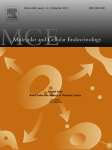Mol Cell Endocrinol:十字花科类蔬菜提取物吲哚3原醇抗乳腺癌细胞增殖机制
2012-07-26 Beyond 生物谷
早期研究十字花科类蔬菜提取物吲哚3 原醇(I3C)能抑制人雌激素依赖型乳腺癌细胞的增殖,诱导雌激素受体α(ERα)蛋白的降解。 近日,一项最新研究运用人乳腺癌MCF-7细胞开展相关研究,发现I3C可降低胰岛素样生长因子受体1(IGF1R)和胰岛素受体底物1(IRS1)的表达,抑制IGF1的下游信号转导效应。相关研究论文发表在Molecular and Cellular Endocrinology
早期研究十字花科类蔬菜提取物吲哚3 原醇(I3C)能抑制人雌激素依赖型乳腺癌细胞的增殖,诱导雌激素受体α(ERα)蛋白的降解。
近日,一项最新研究运用人乳腺癌MCF-7细胞开展相关研究,发现I3C可降低胰岛素样生长因子受体1(IGF1R)和胰岛素受体底物1(IRS1)的表达,抑制IGF1的下游信号转导效应。相关研究论文发表在Molecular and Cellular Endocrinology杂志上。
加入外源性雌激素受体α能逆转I3C介导的IGF1R和IRS1蛋白表达降低,这表明I3C可控制ERα下游调控的IGF1R和IRS1蛋白表达。
I3C可破坏内源性ERα的结合到IGF1R/IRS1 启动子区域上的能力,但不影响Sp1的结合力。因此,I3C可通过抑制ERα的转录,介导的细胞内的IGF1级联信号,抑制雌激素敏感的乳腺癌细胞增殖。总之I3C是一个潜在的抗雌激素敏感的肿瘤治疗药物。
编译自:Indole-3-Carbinol disrupts estrogen receptor-alpha dependent expression of insulin-like growth factor-1 receptor and insulin receptor substrate-1 and proliferation of human breast cancer cells

原文摘要:
Indole-3-Carbinol disrupts estrogen receptor-alpha dependent expression of insulin-like growth factor-1 receptor and insulin receptor substrate-1 and proliferation of human breast cancer cells
Crystal N. Marconett, Ankur K. Singhal, Shyam N. Sundar, Gary L. Firestone
We previously established that Indole-3-Carbinol (I3C), a natural hydrolysis product of glucobrassicin in cruciferous vegetables, arrests the proliferation of estrogen-dependent human breast cancer cells and induces protein degradation of estrogen receptor-alpha (ERα). We demonstrate in human MCF-7 breast cancer cells that I3C ablates expression of Insulin-like Growth Factor Receptor-1 (IGF1R) and Insulin Receptor Substrate-1 (IRS1), downstream effectors of the IGF1 signaling pathway. Exogenous ERα reversed the I3C mediated loss of IGF1R and IRS1 gene expression demonstrating that down-regulation of ERα is functionally linked to I3C control of IGF1R and IRS1 expression. I3C disrupted binding of endogenous ERα, but not Sp1, to ERE-Sp1 composite elements within the IGF1R/IRS1 promoters. Exogenous ERα abrogated, and combined expression of IGF1R and IRS1 attenuated, the I3C mediated cell cycle arrest. Therefore, I3C inhibits proliferation of estrogen-sensitive breast cancer cells through disruption of ERα-mediated transcription of cell signaling components within the IGF1 cascade. Disruption of IGF1R and IRS1 expression is a new I3C anti-proliferative pathway. I3C arrests breast cancer cell proliferation by ablating IGF1R and IRS1 expression. I3C down-regulation of ERα triggers the loss of IGF1R and IRS1 gene expression. I3C disrupts the interactions of endogenous ERα with composite ERE-Sp1 DNA elements. I3C represents a potential anti-cancer therapeutic for estrogen sensitive cancers
作者:Beyond
版权声明:
本网站所有注明“来源:梅斯医学”或“来源:MedSci原创”的文字、图片和音视频资料,版权均属于梅斯医学所有。非经授权,任何媒体、网站或个人不得转载,授权转载时须注明“来源:梅斯医学”。其它来源的文章系转载文章,本网所有转载文章系出于传递更多信息之目的,转载内容不代表本站立场。不希望被转载的媒体或个人可与我们联系,我们将立即进行删除处理。
在此留言





#癌细胞增殖#
34
#CEL#
29
#Cell#
29
#癌细胞#
29
#细胞增殖#
35